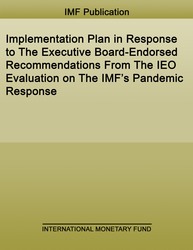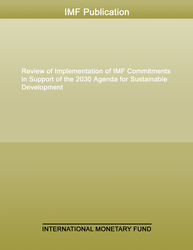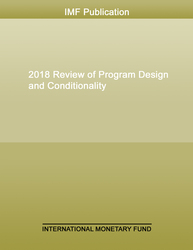
Implementation Plan in Response to The Executive Board-Endorsed Recommendations From The IEO Evaluation on The IMF’s Pandemic Response
The MIP proposes actions and leverages relevant existing workstreams and proposes designing a crisis playbook, enhancing staff reallocation, collaboration with partners, and the Crisis Management Team, and reviewing the adequacy of the lending toolkit.
READ MORE...
Volume/Issue:
Volume 2023
Issue 047
Publication date: October 2023
ISBN: 9798400259173
$5.00
Add to Cart by clicking price of the language and format you'd like to purchase
Available Languages and Formats
| English |
Prices in red indicate formats that are not yet available but are forthcoming.
Topics covered in this book
This title contains information about the following subjects.
Click on a subject if you would like to see other titles with the same subjects.
Exports and Imports , Money and Monetary Policy , Political Economy , Management Implementation plan , COVID-19 , pandemic response , IEO evaluation , lending , IEO recommendation , transparency policy , staff reallocation , implementation plan , Crisis management , Crisis prevention , Emergency assistance , Budget planning and preparation , Global
Summary
The Management Implementation Plan (MIP) proposes actions in response to the Board-endorsed recommendations provided by the Independent Evaluation Office (IEO)’s report on the IMF’s early response to the COVID pandemic. The two IEO recommendations aim for the Fund to (i) Develop special policies and procedures that could be quickly activated to address particular needs and circumstances of global crises and (ii) Take steps to reinforce the Fund’s institutional preparedness to deal with global crises and other large shocks. The MIP highlights how existing workstreams will be used to address part of the recommendations, specifically: (i) Drawing the lessons from the use of precautionary lending instruments during the pandemic and using them in the ongoing review of these facilities; (ii) Drawing the lessons from the implementation of governance safeguards in the context of covid-related emergency financing and respond to the actions identified in the final stocktaking; and (iii) Reviewing financial implications of covid-related lending on Poverty Reduction and Growth Trust (PRGT) resources in the regular updates on PRGT financing and resources. The MIP also defines new actions that aim to enhance the Fund’s preparedness to face future crises and are slated to be implemented by the end of FY25. These consists in: (i) Developing a crisis playbook, which will further codify Management’s commitment to an early participatory consultation with the Board in the event of a global crisis and inform the engagement with the Board on the broad strategy and institutional priorities for responding to the crisis; (ii) Enhancing the process of staff reallocation during a crisis through expanding the staff Talent Inventory to include skills and experience relevant in crises and examining HRD’s coordinating role in staff reallocation, as well as reviewing how recruitment processes could be made more agile in a crisis; (iii) Developing a strategy for surge capacity of the Crisis Management Team; (iv) Reviewing the experience of pandemic-related lending to low-income countries to consider the adequacy of access norms and the possible need for enhancements of the low-income lending toolkit against the long-term financial sustainability of the PRGT; and (v) Exploring ways to further strengthen the coordination with partners, especially the World Bank.
Copyright © 2010 - 2026
Powered by:
AIDC



